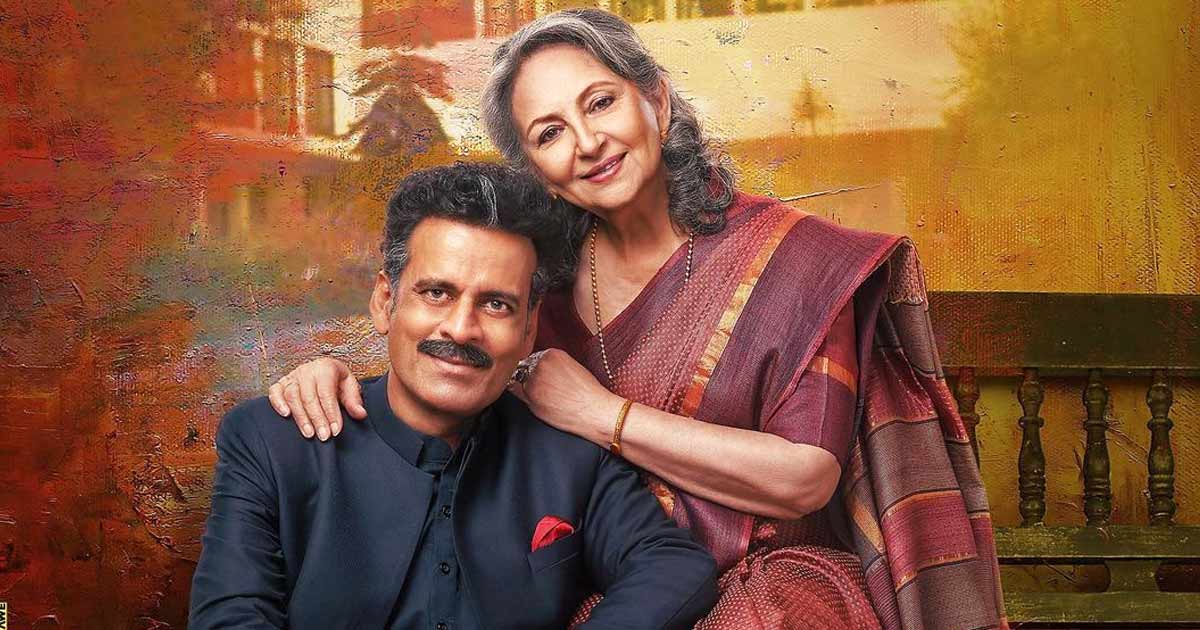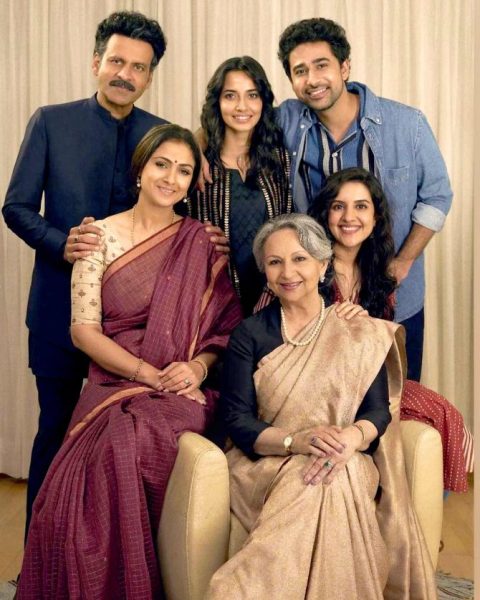
‘Gulmohar’ review: A tender tale that embodies the spirit of love and freedom

The Batras reside beautifully in the splendour of Gulmohar Villa, a bungalow in Lutyens’ Delhi that gives Rahul V. Chittella’s gentle family drama its name. Gulmohar (currently streaming on Disney+ Hotstar) brings together a riveting ensemble cast comprising Sharmila Tagore, Manoj Bajpayee, Simran Bagga, Amol Palekar and Suraj Sharma, who are all part of a heartwarming, but dysfunctional family.
It’s a joy to see Sharmila Tagore back on screen after 13 long years, and it’s even more fulfilling to see that she remains her ever-so-elegant self. Much like her off-screen role, Tagore plays the sophisticated grandmother, whose softness is indicative of the persisting strength she carries within. Her character, Kusum, is the matriarch of the Batra family, who one fine day decides to sell Gulmohar Villa, the ancestral family home.
A gentle tension
Chittella doesn’t opt for a Kapoor & Sons (2016) or Dil Dhadakne Do (2015) kind of family drama, and is instead inspired by his mentor Mira Nair’s Monsoon Wedding (2001), when it comes to setting the pace for the film. He chooses to maintain a gentle tension throughout the film, so that when there’s finally the big confrontation scene, the dialogue is more about the internal turmoil within each character rather than some suspenseful reveal of secrets that result into a war of words. All along, the film hints at the skeleton in the closet, so much so that when it is finally revealed, you’re not gasping in shock, but rather waiting with bated breath to see how everyone reacts to it.
Also read: Nanpakal Nerathu Mayakkam is Lijo’s vision and magic: Film’s writer Hareesh
The friction in relationships is visible from the very first scene, which opens to the guard Jeetu (played charmingly by Jatin Goswami) looking at Reshma, the cook with lovelorn admiration during an on-going farewell party for the Batras’ last day in the house. All is not well, amongst the Batras, as established in the opening scene itself. Arun Batra, played efficiently by Manoj Bajpayee, is upset that his son Aditya Batra (Suraj Sharma) doesn’t want to live with them when they move to a penthouse in Gurugram. Aditya is hell-bent on making it on his own while constantly being at the other end of his father’s disappointment.
There’s also the unrelenting Chhote Dadaji aka Sudhakar, played fiercely by Amol Palekar, who we get to see back on-screen immediately after his pleasing role in Raj Nidimoru and Krishna DK’s Amazon Prime Video’s release Farzi. Palekar plays Kusum’s embittered brother-in-law, who turns out to be the key rabble-rouser in the family. Despite not being in the party, he is quick to summon his son, Kamal Batra (played by Anurag Arora), and his family back home because he doesn’t agree with Kusum’s manner of living which includes drinking with her kids and grandkids. A staunch right-winger, Sudhakar refuses to drink the tea made by Reshma, given her caste, and applauds his own grandson’s allegiance to the ruling party.

Of course, the ball is yet to drop on the announcement that will finally set it rolling — with a gulp of brandy down her throat, Kusum announces that she, too, will not be moving in with Arun to the penthouse, and has instead bought a home in Pondicherry for herself. This is a spark that will soon set off the fireworks, as one after the other, secrets unravel, tension rises and relationships threaten to crumble.
A chord of coherence and lyricism
However, throughout it all, Chittella’s film embodies the spirit of love, and freedom, where the most enchanting relationships are formed not by blood, but by choice. The house, named ‘Gulmohar’, is reminiscent of the fleeting beauty of gulmohar flowers amidst Delhi’s pollution and industrialization, much like the rarity of a joint family, living in a world that is increasingly nuclear in its way of life.
There is profound poetry in the precise filmmaking of Chittella that says way more than it tells. He cleverly creates several plot threads that weave into the larger scheme of things — Kusum’s will to live on her own terms; Amu’s (Arun’s youngest daughter) battle to accept her sexuality; Aditya’s struggling start-up that strains his marriage; Arun’s fractured relationship with his son, as well as himself; Indu’s struggle to manage everything and everyone; Jeetu’s love for Reshma that gets embroiled in a conflict between the heart and mind; and, alas, Sudhakar’s incessant need to win, even at the cost of breaking up the family.
What remains as something to marvel at is how despite juggling with so many stories, Chittella manages to strike a chord of coherence and lyricism in a film that could’ve easily become tone-deaf in its quest to dabble between pertinent topics like homosexuality, caste, religion, education, and the politics of familiarity.
Also read: ‘Beyond Utopia:’ A harrowing account of how a ‘defector’ flees North Korea
It’s also worth noting that the cast does an impressive job at bringing alive the Batra family in flesh. Sharmila Tagore is undoubtedly the star of the moment, but for me it is Simran, who remains everlastingly in your head. In one of my favourite scenes, her character, Indu, lashes out at her husband Arun for irresponsibly cracking down when things go wayward, something that is a luxury to her since she has to be the one to get a handle on things. It is at this moment that you realize that only she could have materialized this rage laced with love on-screen, with so much nuance.
Love: the biggest currency
Another commendable performance is by Suraj Sharma, who has grown into his own since Life Of Pi (2012), and doesn’t even bend a finger to convey his emotions. His overtly expressive depiction of Aditya allows you to relate with him as he oscillates between being independent and seeking approval of his father. Bajpayee is, of course himself, a seasoned actor with an eternally refreshing touch to characters and stories. Not to mention, a pleasant cameo by Talat Aziz as Kusum’s friend Avinash, who soulfully croons dilkash sazaa yeh dijiye, zulm-e-hansi kijiye…
Palekar, on the other hand, feels a bit stiff in his role as Sudhakar, but then again, he is also the character that gives Gulmohar its most glaring flaw. For a film that celebrates individuals as stories, not a one-dimensional canvas of black and white, Sudhakar’s character seems too explicitly villainous.
This is where Chittella falls prey to the classic Hindi film trope that he managed to avoid all along — the hero and the villain. Sudhakar is given no arc, just a simple explanation of how he holds the grudges of broken bonds, leading him to be this vengeful of Kusum and her family. However, none of this backstory is fleshed out, and neither is he humanized enough to give you an opportunity to see where he is coming from. You’re forced into disliking the man because he is the bad guy, a disappointing glitch in an otherwise figurative film.
All that said, Gulmohar stands out for its tenderness, and for what it’s worth, the way it reminds you that life is all about the few people who make home. It’s a film that teaches you that in a world where, caste, creed, religion, and education are powerful notes, it is love that is the biggest currency of them all. As a character quips, “yeh I love you bolne ke liye, koi school, college ka zaroorat nahi padta, sirf apna Shah Rukh Khan ka picture kaafi hai.”

